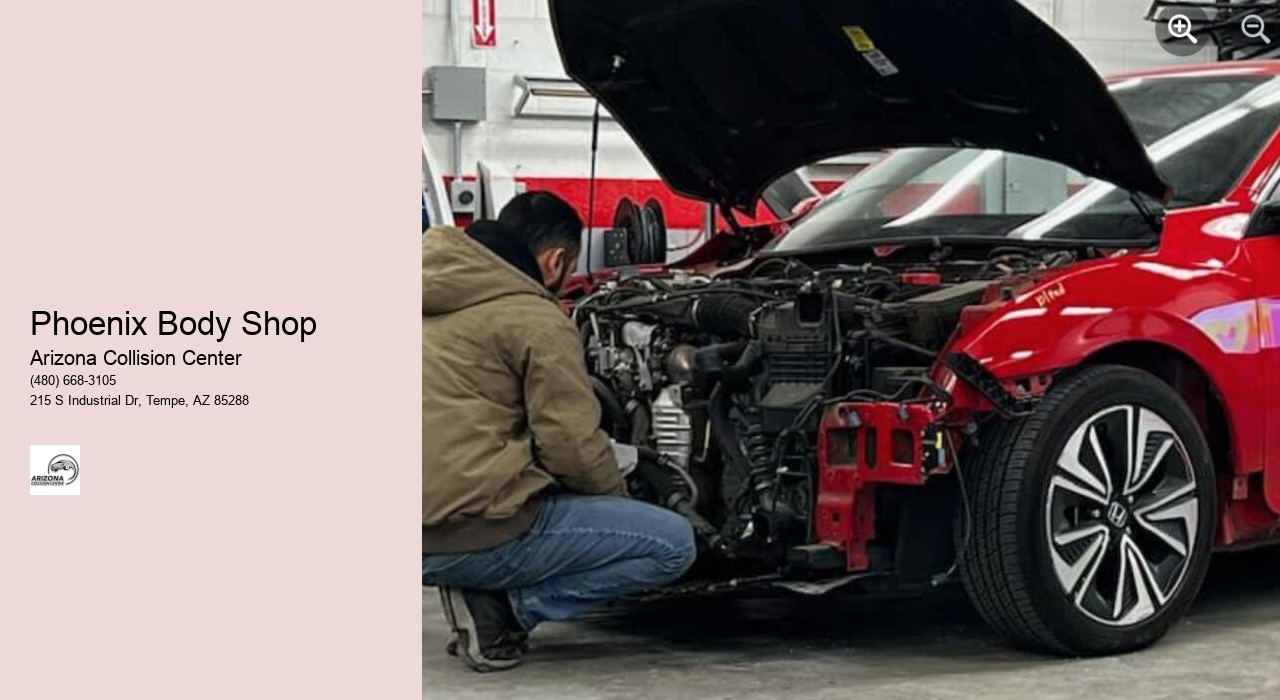

View Arizona Collision Center - Tempe Body Shop and Col in a full screen map
https://arizonacollisioncenter.com/services/collision-repair-tempe/
| Specialized Services & Locations | |
|---|---|
| Collision Center in Tempe AZ | A dedicated collision repair center in Tempe, AZ, providing comprehensive damage restoration services. |
| Custom Auto Paint Tempe AZ | Auto painting services in Tempe, including custom colors and finishes for vehicle personalization. |
| Body Shops Near Phoenix | Auto body repair shops located near Phoenix offering collision repairs and paint jobs. |
| Collision Repair Phoenix | Collision damage repair services available throughout Phoenix for various vehicle types. |
| Auto Claims Assistance | Support services to help vehicle owners file and manage insurance claims for collision repairs. |
Located in Tempe, Arizona Collision Center is a full-service collision and body shop dedicated to quality craftsmanship. Our facility is staffed with experienced, certified technicians who focus on meticulous attention to detail. If your vehicle has been involved in an accident and needs reliable collision repair or body work, we’re here to help. We’re a preferred partner with all major insurance companies and will work to ensure you get the best settlement from your carrier. We assist with your claim process and use only brand new parts from the manufacturer. Our services also include custom auto body work and paint jobs.
After an accident, it's crucial to assess the damage to your vehicle as soon as possible. A thorough inspection will help you understand the extent of the auto body damage. Look for dents, scratches, and parts that might have become misaligned. Even if the damage seems minor, underlying issues could lead to bigger problems down the road.
Keeping your car clean after an accident is more important than ever. Dirt and debris can get into small cracks and scratches, leading to rust and corrosion over time. Wash your car regularly, paying close attention to damaged areas. Apply a coat of wax on undamaged paint to protect it from the elements, but avoid waxing damaged paint until it has been properly repaired.
Seek professional help for repairs. Auto body specialists have the tools and expertise required to fix damages accurately. Whether you need dent removal or a new panel fitted, professionals will ensure that repairs meet safety standards while also restoring your vehicle's appearance.
Until all repairs are completed, be extra cautious with how you handle your car. Avoid rough roads that could exacerbate body damage or put stress on weakened areas of your vehicle's frame or structure. If necessary components like lights are damaged, avoid driving at night or in poor visibility conditions until they're fixed.
Once your car has been repaired, monitor its performance closely for any signs of trouble which may be related to the recent accident. Listen for unusual noises or pay attention to changes in handling; these could indicate that there were additional issues that weren't identified during repair.
Maintain records of all repairs done on your vehicle post-accident including detailed descriptions and dates of service—this paperwork can prove invaluable if you decide to sell your vehicle in the future. Regular maintenance checks following repair work will help ensure everything remains in top condition and preserve your car’s value.
The collision repair industry is increasingly adopting eco-friendly materials and practices. In 2023, a significant trend is the use of sustainable paints and coatings that have a lower environmental impact. These products not only help auto body shops reduce their carbon footprint but also meet consumer demand for greener repair options. Additionally, recycling parts and materials has become standard practice, contributing to a more circular economy within the auto repair sector.
With the proliferation of advanced driver-assistance systems in modern vehicles, calibration has become a crucial part of the auto body repair process. Nowadays, even minor collisions can disrupt these sensitive systems, necessitating precise recalibration post-repair. Repair shops are investing in high-tech equipment and training to ensure ADAS features such as lane-keeping assist or adaptive cruise control function correctly after an accident.
As electric vehicles (EVs) continue to grow in popularity, collision repair shops are specializing in servicing these high-tech automobiles. EVs come with unique challenges, including battery system repairs and specialized structural components. The latest trend sees auto body professionals gaining certifications specific to different EV makes and models to accommodate this growing segment of the automotive market.
Convenience is king for car owners seeking repairs after a collision. Mobile repair services that come directly to customers are becoming more prevalent. These services offer quick fixes for minor damages like dents and scratches without requiring vehicle owners to visit a shop. This trend caters to busy lifestyles where time-saving solutions are highly valued.
The adoption of 3D printing technology is revolutionizing how replacement parts are sourced and utilized during repairs. Auto body shops are using 3D printers to create on-demand parts that may be difficult or time-consuming to obtain through traditional supply chains. This innovation accelerates the repair process while potentially reducing costs associated with inventory management.
Data analytics play an ever-increasing role in optimizing both the technical aspects of collision repairs as well as enhancing customer service experiences. By analyzing data from past jobs, shops can predict trends, streamline their processes, improve turnaround times, and customize service offerings based on customer behavior patterns.
Virtual reality technology is being used extensively for technician training within the collision repair industry in 2023. VR enables trainees to engage with realistic scenarios without needing physical vehicles present for practice purposes—this helps technicians learn new techniques efficiently while also minimizing resource use during training sessions.
Often, yes, if the repair is due to an accident covered under your policy; confirm with your insurer.
Ensure safety, exchange information, document the damage, contact your insurance, and visit a trusted collision repair shop.
Practice safe driving, stay attentive, follow traffic laws, and maintain your vehicle regularly.